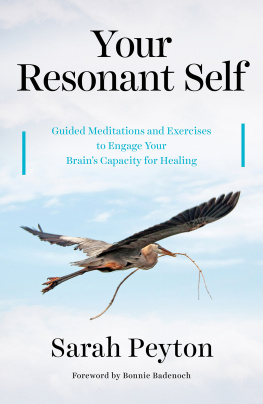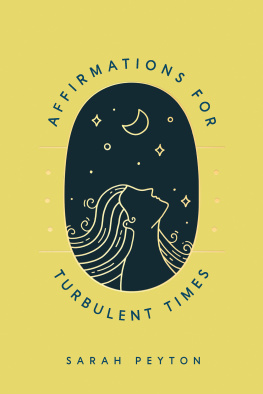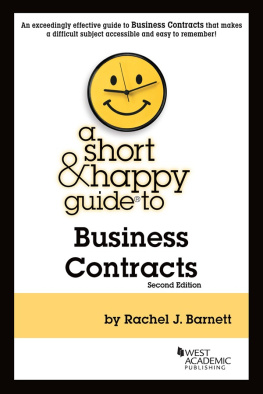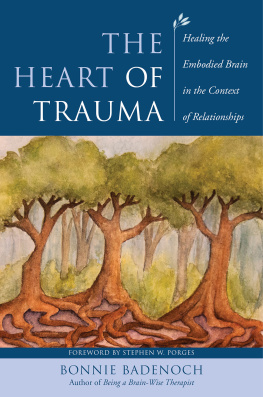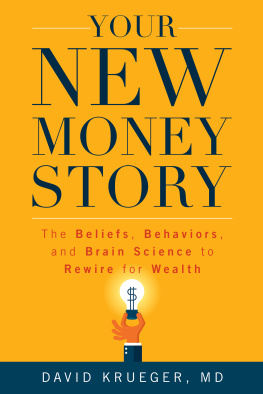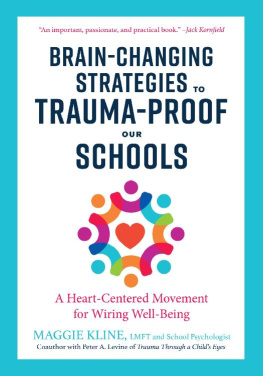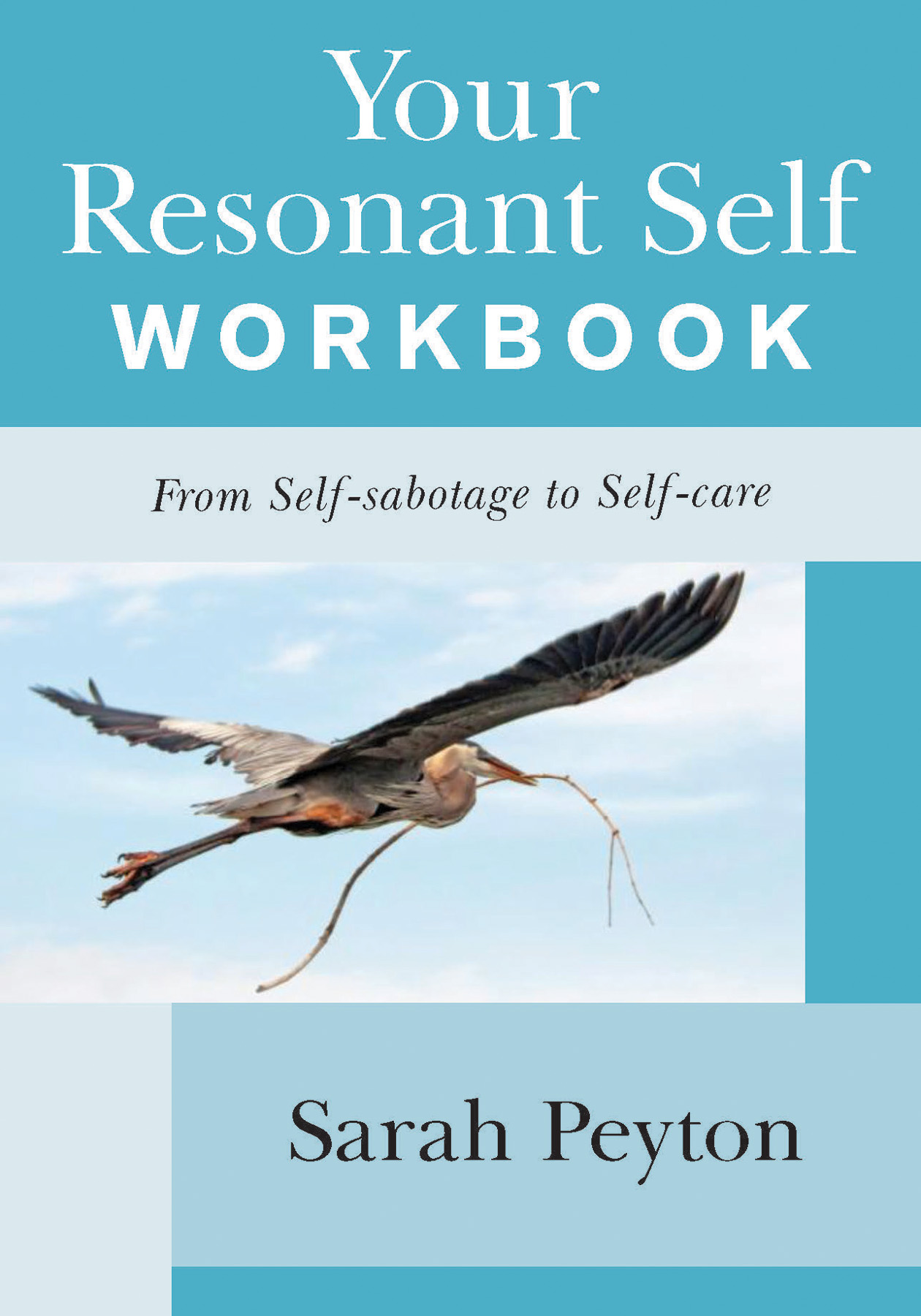Contents
Guide
Page List
Your
Resonant Self
WORKBOOK
From Self-sabotage to Self-care
Sarah Peyton

A Norton Professional Book
This e-book contains some places that ask the reader to fill in questions or comments. Please keep pen and paper handy as you read this e-book so that you can complete the exercises within.
I dedicate this book to Matt Wood,
for decades of love, support, and delight.
CONTENTS
Dissolving Blocks to Resonance: Unconscious Contract Work
The stakes are so high.
Self-warmth makes everything better: our health, our immune system, our life decisions, our sense of meaning, our capacity for engagement, our effectiveness, and our intimate connections with others.
But we may have agreements with ourselvesagreements we dont even know aboutto NOT be warm with ourselves. We may have contracts to not like ourselves, to be indifferent, even to hate and be cruel to ourselves (and others). Without knowing it, we make these self-agreements in order to leverage our nervous systems to take care of the people around us. For example, we may make sure we are never sad so that things are easier for our families. The long-term results for our bodies, minds, and nervous systems can be tragic, even though we originally wanted to do the best thing for everyone.
These contracts are often made before we can talk. The only thing a baby has to contribute to balancing a family is that babys own nervous system.
When my mother is sad, I will be happy in order to cheer her up.
When my father is depressed, I will be angry in order to bring him to life.
When my siblings are fighting, I will get sick in order to change the violence.
I will hate myself in order to atone for being a burden on my mother.
When people have these contracts, it doesnt matter how much they practice liking themselves or do meditations to increase self-warmth. These contracts are the ground on which everything else is built, and so they create persistent stories about the self: I am not worthy of love. I am an angry person. I am never sad. I cannot say no. I always get sick. My needs dont matter. When these contracts and stories are present, they turn to stone inside a person, preventing the emergence of the organic, growing self that is supposed to be the heart of everyones life journey.
After I finished writing my first book, Your Resonant Self: Guided Meditations and Exercises to Engage Your Brains Capacity for Healing, I began to travel all over the world to teach people resonant language. Resonant language is a way we can talk with ourselves and others that creates connection, supports the emergence of a sweet sense of self, lets whats true be named, and heals emotional trauma. I discovered that, even when the material made sense to people, there were certain times that they were just unable to turn toward themselves with kindness and warm curiosity. Why was this happening?
As we learn about relational neuroscience, we discover that the brain is always trying to take care of us, usually based on lived, historical evidence. We are discovering that addictions, suicidality, incarceration, and diseases connected with a lack of self-care are the result of the brain doing its best to try to take care of us around trauma rather than a result of weakness or bad genes, as previous generations believed. Once I had this understanding of the brain, I wondered how the resistance to self-warmth could also be the brains best attempt to take care of us.
Although I had an instinct that there was a very good reason for this resistance, I had no idea what it was. So I started looking at myself. What were my own blocks to self-warmth? (And believe me, even though I wrote the book Your Resonant Self, I still have plenty of these blocks.) I started to look at one puzzling way that I was sabotaging myselfI found it extremely difficult to take a rooms attention when I was with women older than myself. If I had a good reason to collapse, what might it be? How could I discover it? It felt like this pattern of sabotaging myself was an iron-clad contract, and so I thought the right language might help me understand what was happening.
First of all, since it was gender specific, I had a guess that it was about my mother. I gave it a try: I, Sarah, promise myself that I will not take up space when I am with my mother... I stopped and felt deep into my own body, almost asking my belly about this way of being, and my belly answered me:... in order to make sure that my mother receives enough attention to survive.
Oh, dear, I thought. What a loving but absurd vow. I was reminded of being a small child, seeing with such tenderness my mothers awkwardness in the world and wanting so much for her to have a sense of her absolute belonging. Here I was, a helpless child, leveraging the only thing I had, my own nervous system, to create the world I wanted to live in.
I decided to follow along with this process that was creating itself. What was the next logical step in working with the contract? Somehow the way that I had begun the wording, it sounded so legal and contingent, and the ritual unbinding of contracts came into my head. Since every contract has at least two parties, I imagined myself to be two different selves, the very best part of me, which I decided to call my essential self, and the part of me who might originally have made this contract. I started a dialogue between them to see if both parties still wanted to keep this ancient agreement:
Sarahs essential self, did you hear the vow that Sarah made to you?
Yes, I did.
Do you still want this contract?
No, this is a silly contract. Sarah, I release you from this contract and I revoke this vow.
To my surprise, I took a full breath and felt my whole body relax. I revisited my idea of not taking up space. Though before I began this piece of work, I had been utterly convinced that I could not take up space, the idea now seemed immaterial. It had nothing to do with me. I started to have an easier time co-facilitating with women who were older than me.
And I started thinking. If I had had such a contract, which had been structuring the way I defined myself, maybe other people also had these contracts, these old agreements made even before they had language, which gave them very good reasons for self-sabotaging behaviors like self-hate, rabid self-criticism, procrastination, an inability to try, lack of trust in self and others, and so on.
The next thing to do was to take this work into the world and find out if other people really did have these agreements with themselves. In this book, you will journey along with me in this discovery process, and as the people I meet do their work on these pages, you will be invited to follow along with them and enjoy the way this work can often help people turn toward themselves with an ease and warmth that are astounding.
Although unconscious contracts may take many shapes and have a wide range of impacts, the basic need underlying them is for our infant life energy and emotions to be welcomed by the people taking care of us. When we have to try to take care of others rather than getting to grow into our own selves, we can carry these limitations with us out of childhood, with lifelong implications for our health and well-being.
We also make these contracts in moments of trauma; they are knots we tie using ourselves as ends of the rope when something difficult happens (shame, overwhelm, horror, terror, rage, abandonment, emptiness) and we are unaccompanied by resonance. Surprisingly, these knots often have love or deep care at their core. In traumatic moments, our whole brain-body system tries to figure out what we can do to keep this difficult thing from ever happening again. We make all kinds of unconscious agreements with ourselves:
Next page

